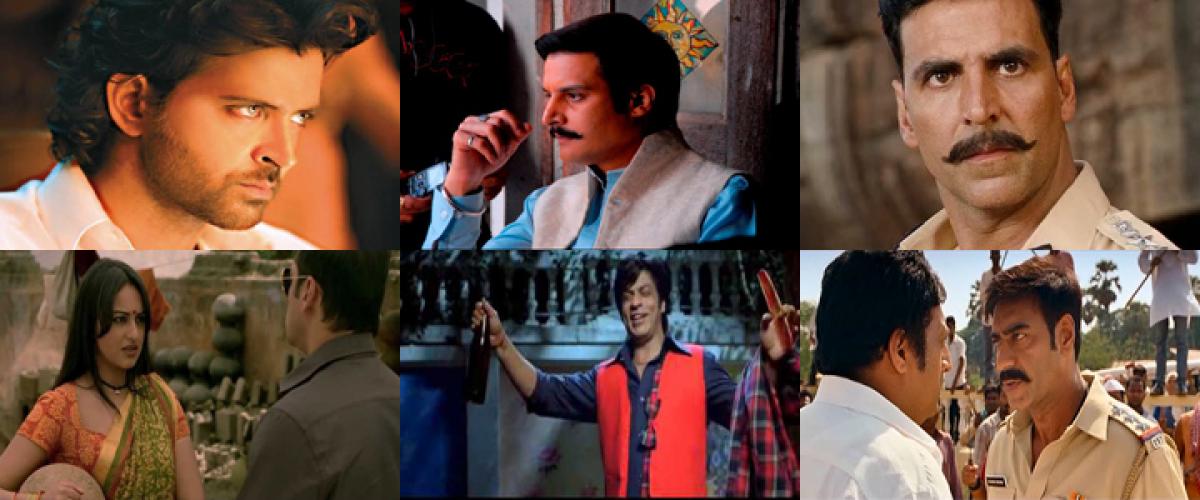Live
- DEO suspends teacher accused of sexual assault
- PM ‘cursing’ Congress out of despair: Maharashtra Cong Chief
- Applications are invited for Junior Colleges Scheme District Scheduled Castes Development Officer Ramlal
- A nomination was filed on the second day for the Nagar Kurnool parliamentary seat
- SP Gaikwad inspected the Telangana Amarnath Saleswaram Jatara yatra arrangements
- Rahul Gandhi's decision to contest from Wayanad shows 'lack of confidence': BJP President Nadda
- IPL 2024: Delhi bowlers will go after all of SRH’s top-order batters, says head coach Ricky Ponting
- At Amroha rally, PM Modi sends out ‘meaningful’ message for Muslims and Hindus
- Tripura records highest 79.83 pc voter turnout in Northeast
- The government has to clear the confusion
Just In

It was, I think, the Star Screen Awards of 1991 and Kabir Bedi was the presenter. That year Kamlesh Pandey had won the best dialogue awards for the iconic lines that he wrote for Rajkumar in ‘Saudagar’ – “Hum tumhein marenge aur zaroor marenge.”
Powerful dialogues have always wooed the audience. Here are some iconic lines from Bollywood that have mesmerised viewers
It was, I think, the Star Screen Awards of 1991 and Kabir Bedi was the presenter. That year Kamlesh Pandey had won the best dialogue awards for the iconic lines that he wrote for Rajkumar in ‘Saudagar’ – “Hum tumhein marenge aur zaroor marenge.” I need not write the full dialogue here. If you have not heard of this dialogue obviously you are not a Bollywood fan like yours truly. What has stayed with me over the years is what Bedi said of Pandey. He told the entire audience that Pandey once told Kabir this – “Hindustan main logh film sunte hain” (In India people “listen” to movies.)
What had hurt me almost till 2005 wasthat in those 15 odd years since ‘Saudagar’ the quality of dialogues went totally downhill, until the dialogues started making a glorious comeback around 2005. Here are some of my favourite ones from the last decade.
“Meri zarooratein kam hain, isiliye mere zameer main dum hai.”
‘Singham’. There are some commercial movies, which end up giving us a few pieces of advice through dialogues. A ‘by the book’ cop tells a corrupt mafia politician of a big city about his philosophy of living by his means through this dialogue.
“Thappad se dar nahi lagta sahab! Pyar se lagta hai”
‘Dabangg’. I doubt if any other screen heroine was lucky enough to get such a strong dialogue for herself in a debut movie. A dialogue that establishes the steel and grace of Rajeshwari Pandey AKA Rajjo! The cynicism of a street level potter girl, who fights for dignity despite getting a raw deal from life, is fantastic. Try hard and you will find very few dialogues from a lady, which have left capable suitor speechless.
“Picture Abhi Baaki Hai Mere Dost”
‘Om Shanti Om’. A dialogue, which is again a street level cult now for all underdogs, all those who have lost a game and even MS Dhoni our Captain Cool have who once used this dialogue in a press conference. A story of reincarnation and retribution revolves around this dialogue at many plot points. A line that was used for different situations within the movie is one of our better written multipurpose dialogues.
“Jo main bolta hoon wo main karta hoon! Jo main nahi bolta wo main definitely karta hoon”
‘Rowdy Rathore’. Another dialogue, which has since became a street-level slang now. This dialogue established Akshay Kumar’s brand big time. It is a dialogue that probably draws its inspiration from an iceberg. The hero constantly reminds his nemesis with this line that there is more to me than you can handle.
“Koi kamzor ye nahi keh sakta ke usne pehelwan ko maaf kiya”!
‘Agneepath’ (2012). In this remake of the original Mukul Anand classic, young Vijay is given his biggest life lesson by his school teacher father. How often non-violence is practised by the cowards? It was this dialogue, which a grown up Vijay finds his mission statement. A dialogue that he often repeats to all those who he wants to send a message of either a warning or an advice.
“Ek galti aur dhai sau rupaye main naam roshan ho jayega tumhara”
‘Sahib Biwi Aur Gangster’. If I were to use corporate slang, I doubt if KRA (key result areas) and cost of firing were ever spoken more accurately while hiring someone. A local power lord hires a new assistant and at the same time he is purchasing costly bullets of Rs 250 each. When the new worker claims that he won’t give a chance to complain; the hirer played with cold fury by Jimmy Shergill delivers these lines – there won’t be complaints. It will cost only Rs 250 to bump him off and make him famous. Accurate!
“Baat khatam karni hai ya kahani shuru”
‘Once Upon a Time in Mumbaai’. Dialogues like these made Sikandar Mirza of ‘Once Upon a Time in Mumbai’, a character as intriguing and as fascinating as Bhiku Mhatre of ‘Satya’. A man, who brings ethics to criminals and a system to crime world. Sikandar Mirza’s attitude of avoiding conflict is well established with these lines when his boys are planning retribution. In one line the emptiness of journeys of revenge is established. Brilliant!
- Rahul Deo Bharadwaj http://thesocietyasiseeit.blogspot.in

© 2024 Hyderabad Media House Limited/The Hans India. All rights reserved. Powered by hocalwire.com







